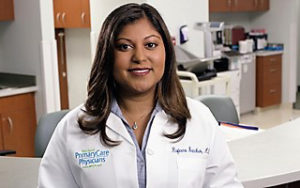Category Archives: Health & Wellness
Well-Child Visits: Foundation for a Healthy Life
A Q&A with Dr. Jamie Harms
Dr. Harms explains why children, like adults, should see their doctor for annual checkups.
Q: My child isn’t sick. Why should they get a checkup?
A: A yearly checkup – known as a “well-child visit” ─ helps monitor your child’s development and can spot potential health problems. The visits also help your child develop a positive relationship with their doctor, a relationship that will become the foundation of good health care throughout your child’s life.
Most parents are good about bringing babies and preschoolers in for regular appointments, but after children start school, visits tend to drop off. When that happens, we miss a lot of opportunities to help kids grow up healthy.
Q: What happens during a well-child visit?
A: We track your child’s growth and development, including their vision. It’s surprising how many kids start school with vision problems, which can impact their ability to learn. We can help detect issues so kids can do well in school.
Children change a lot in 12 months, and we can tell you what to expect in the coming year. If you have questions or concerns about your child’s health, we can answer your questions and direct you to health resources.
We can help teach your child good health habits, like eating healthy, getting enough sleep, and balancing screen time with active play time. The annual visit is also a good place for kids to learn how to deal with social pressures they will encounter at various ages, including relationships, drinking and drugs.
Q: What else happens in the appointment?
A: We will make sure your child receives any needed immunizations, including measles, polio, tetanus, diphtheria, pertussis and influenza (flu). Kids who don’t see their doctor regularly miss these vaccines and are at higher risk for serious illness. In fact, many college-age kids have missed important immunizations, even though some diseases are most likely to occur in the teenage years, such as human papillomavirus (HPV) and meningitis.
Q: What problems do you typically see?
A: There’s a big problem with children not getting enough physical activity. With too much time spent watching TV, playing video games or being on their phones, many kids don’t build bone strength or develop good cardiovascular health. Inactivity during childhood can lead to serious problems later, including obesity, heart disease and diabetes.
Also, some of the kids we see don’t get enough sleep. We live a crazy 24-hour society, and children get drawn into that. Kids ages 6-13 need 9-11 hours of sleep each night, and teens need 8-10 hours. Lack of sleep can cause emotional and behavioral problems and poor performance in school.
Q: When should my child get a checkup?
A. It’s a helpful reminder to schedule the visit near your child’s birthday each year. And many MPCP offices have extended hours, so you don’t have to pull your child out of school.
Setting good health habits early makes a real difference. The whole idea of staying healthy starts with seeing the doctor once a year. It’s never too early to start building a healthy life.
Why You Need a Checkup (Even If You Feel Fine)
By: Manuel Skow, P.A.
If you feel okay, you don’t need to see the doctor, right?
Wrong. An annual checkup with your primary care doctor should be part of your regular health routine, just like exercise. Here are five good reasons to schedule a checkup, even if you feel fine.
1. Staying healthy
Keeping up to date with vaccinations and screenings is basic to good health. Vaccinations can prevent some serious diseases, such as measles, polio, diphtheria, whooping cough, German measles, mumps, tetanus, rotavirus, the flu and even cervical cancer. And screening tests are done to detect potential diseases in people who do not have any symptoms, leading to the early identification of serious conditions such as high blood pressure, high cholesterol, diabetes and cancer. Early detection is important because it provides the best opportunity for a cure.
2. Knowing your numbers
Do you know your numbers? They include:
- Blood pressure
- Cholesterol level
- Blood sugar level
- Body mass index
High blood pressure and blood sugar, and unhealthy weight and cholesterol, greatly increase your risk for heart attacks, strokes and kidney disease. Also, if you have prediabetes or diabetes, you must carefully monitor your number to control the disease and improve the quality of your health.
Your doctor can help you learn your numbers and take steps to keep them in a healthy range.
3. Creating a medical record
Annual visits to the doctor are a chance to update your personal medical record. This record helps your doctor keep tabs on your health and monitor any issues you have. Also, if you are hospitalized in an emergency, having access to your medical records can reduce unnecessary testing, prevent allergic reactions, and help you get the best care possible.
4. Building a doctor-patient relationship
This relationship doesn’t just happen. It takes several visits for your doctor to really understand you, and for you to feel comfortable with your doctor. A good relationship is important because it can affect any treatment you receive, such as whether you can take certain medications.
5. Low-cost prevention
Most health insurance covers an annual checkup, including lab tests. There may be a small co-pay, but this is usually minimal. For one low fee, your doctor can assess your health, discuss your needs and concerns, and help you head off potentially serious health issues.
Has it been more than a year since your last checkup? Call your MPCP office today to set one up and get started on your healthier future.
 Manuel Skow, Physician Assistant, received his Master of Science/Physician Assistant degree from St. Francis University, and completed his Physician Assistant Preceptorships in Primary Care at the U. S. Naval Academy Brigade Clinic and Internal Medicine/Cardiology at the Walter Reed Army Medical Center. He sees patients in MPCP’s Glen Burnie office.
Manuel Skow, Physician Assistant, received his Master of Science/Physician Assistant degree from St. Francis University, and completed his Physician Assistant Preceptorships in Primary Care at the U. S. Naval Academy Brigade Clinic and Internal Medicine/Cardiology at the Walter Reed Army Medical Center. He sees patients in MPCP’s Glen Burnie office.
Got Friends? You’ll Live Longer
People with strong social networks tend to be healthier, live longer and are happier.
By: Andrea C. Cuniff, M.D.
You’re probably familiar with the social benefits of friendship. Our friends:
- Increase our sense of belonging and purpose
- Boost our happiness and reduce our stress
- Improve our confidence and self-esteem
- Help us cope with trouble, such as serious illness, job loss or the death of a loved one
Now, there’s a growing body of research showing that strong friendships can also improve your health. Adults with good social support have a reduced risk of many significant health problems, including depression, high blood pressure and obesity. Women have better odds of surviving ovarian and breast cancers, and both sexes live longer after surviving a heart attack.
In fact, a recent study of older adults found that those with large circles of friends lived 20% longer than others with fewer friendships.
Despite the proven benefits of friendship, many of us find it difficult to maintain existing relationships or make new ones. In our busy lives, time with friends takes a backseat to jobs, children and other responsibilities. Or maybe you moved to a new community and haven’t met many people yet.
It’s also important to remember that when it comes to friendship, quality counts more than quantity. It’s good to have a big circle of friends, but you also want to cultivate a few truly close ones who will always be there for you.
Nurturing friendships
Maintaining friendships takes time and effort. Try these tips to keep your existing relationships healthy:
- Practice kindness. Think of friendship as an emotional bank account. Each kind deed and word is a deposit into this account, while criticism and negativity reduce the balance.
- Listen closely: Ask what’s going on in your friends’ lives and pay close attention to their responses. When they share details of hard times, be sympathetic but don’t give advice unless they ask for it.
- Open up about yourself. Being willing to disclose personal experiences and concerns shows that your friend holds a special place in your life, and it deepens your connection.
- Show that you can be trusted. Follow through on commitments you’ve made. When your friends share confidential information, keep it private.
- Make yourself available. Building a close friendship takes time. Make an effort to see new friends regularly, and to check in with them in between.
Making new friends
It’s just as important to expand your circle of friends. Look at your existing social network for possible new connections. Think about people who:
- You’ve worked or taken classes with
- You’ve been friends with in the past but have lost touch
- You’ve enjoyed chatting with at social gatherings
- You share family ties with
If anyone stands out, reach out. Extend an invitation to coffee or lunch, or ask a mutual friend to introduce you. You will need to be persistent, and you may need to meet a few times before you can tell if this new relationship will work out.
Other good ways to make friends include:
- Attend community events: Look for groups or clubs that gather around an interest or hobby you share.
- Volunteer: You can form strong connections when you work with people who have mutual interests.
- Join a faith community: Attend special activities and events for new members.
Starting and keeping friendships takes time and commitment. But it’s an investment that can pay off in better health and a happier life for you and your friends.
 Dr. Andrea Cuniff received her medical degree from the University of Maryland School of Medicine and completed her residency program in Family Medicine at Franklin Square Hospital Center. She is certified by the American Board of Family Medicine and sees patients at MPCP’s Annapolis office.
Dr. Andrea Cuniff received her medical degree from the University of Maryland School of Medicine and completed her residency program in Family Medicine at Franklin Square Hospital Center. She is certified by the American Board of Family Medicine and sees patients at MPCP’s Annapolis office.
Making the Most of Your Doctor Visit
A Q&A with Rafeena Bacchus, M.D.
Most of the time, your primary care physician is your first contact for health care. When you make an appointment, knowing how to prepare and what to expect will help you get the most out of your visit.
Q: What kind of appointments can I get at MPCP?
A: We offer two types of appointments:
- A problem visit addresses a new problem or revisits an old one.
- A physical examination is a preventative visit to review your history, examine your body from head to toe, check appropriate blood work (like blood sugar and cholesterol), administer age-appropriate immunizations, and offer age-appropriate screening referrals (like mammograms and colonoscopies).
Making the right kind of appointment will ensure that your doctor can effectively address your health needs.
Q: Can I do anything to get ready for my appointment?
A: There are several steps you can take ahead of time to make sure your appointment runs smoothly:
- Be very clear about what you need when you make your appointment. This allows your doctor to properly prepare for your visit. For example, if you have abdominal pain, your provider can offer you a drape so you can undress from the waist down for an exam.
- Know what referrals you need.
- Take a few minutes to write down notes and questions to make sure all of your concerns get addressed.
- If your provider asked you to monitor your blood sugar or blood pressure, remember to bring those logs in with you.
- If you want to discuss tests ordered by a provider outside of MPCP, don’t assume that we have received these records, even if you asked for them to be sent. Track them down and bring them with you. If you need help tracking down records, call your provider’s assistant a day or two prior to your appointment to alert MPCP to this request.
Asking for copies of test results when you are seen elsewhere is always a good idea. It facilitates your bringing them to your provider for discussion and helps eliminate duplicate testing. Feel free to ask for the records and test results – they belong to you.
Q: When should I arrive for my MPCP appointment?
A: Come 10-15 minutes early to complete paperwork, use the bathroom and gather your thoughts. Turn off your cellphone. This will ensure your entire appointment is used for face-to-face time with your doctor.
Q: How long will my appointment last?
A: Appointment lengths vary from 10 minutes for simple problems to 30 minutes for physical examinations or complex problems.
While your provider would like to be able to address every concern you have, this may not be possible due to time limits. You may need more than one visit or visit type to address all of your concerns.
Q: Sometimes my visit is delayed. Why is that?
A. The most common reasons your doctor might be running late for your appointment are patient tardiness, complicated problems and emergencies. Feel free to ask the check-in staff if your provider is running on time.
Q. What does my doctor need to know about my medications?
A: Your doctor will need to know 1) what medications you take, 2) why you take them, 3) the dose for each one, and 4) how often you take them. We encourage all patients to create a list of all medications, supplements, and vitamins you take. Include any drugs a specialist or urgent care center added to your regimen. Some patients bring the actual pill bottles to avoid confusion.
Your doctor can print a list at checkout of all the active medications we are aware of you taking. Once your provider has a full picture of what you take, they can help you avoid drug-drug interactions or be alert to medication-induced illness.
Q. Is it okay to ask questions?
A. It’s your doctor’s job to make sure you understand and follow through on care, so don’t be afraid to ask questions.
If you don’t understand what your doctor tells you, say so. Repeat back what you hear to confirm you have it right. Take notes. If you still aren’t clear after you leave the appointment, call back and ask for clarification.
Q: What health records should I keep?
A. It’s a good idea to keep a folder with copies of these health records:
- Recent test results
- Your current medication list
- Your insurer’s list of covered medications
- A list of your providers with contact information
- Pending referrals
- Lists of your questions
- Blood sugar or blood pressure diaries
- Vaccine dates
Take notes at your office visits to help you remember important points about your care, and keep them in your folder so you can review them when necessary. Bring your folder on any visit to a healthcare provider, an urgent care center or hospital to help reduce gaps in your care.
Q: What happens after my appointment?
A: MPCP uses its online Patient Portal to communicate test results, or you doctor may call you. But if you don’t get test results in a timely fashion, be sure to ask for them.
Take prescribed medication as directed, and talk to your provider if you have side effects and need to make adjustments. If your doctor schedules a follow-up appointment, be sure to keep it so your doctor can check on your progress and make any needed changes to your care.
 Dr. Rafeena Bacchus sees patients at MPCP’s Columbia office. She received her medical degree from SUNY at the Buffalo School of Medicine and completed her residency program in Internal Medicine at the University of Maryland. She is certified by the American Board of Internal Medicine.
Dr. Rafeena Bacchus sees patients at MPCP’s Columbia office. She received her medical degree from SUNY at the Buffalo School of Medicine and completed her residency program in Internal Medicine at the University of Maryland. She is certified by the American Board of Internal Medicine.



